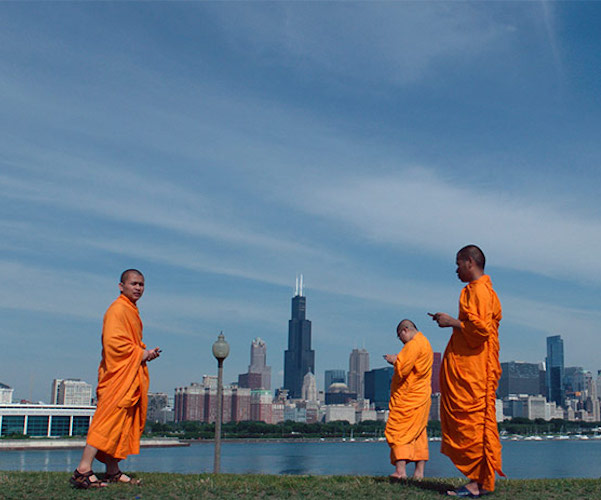Film Review: “Lo and Behold” — Oh, Werner!
We’re very fortunate that this kooky cinematic icon finds the internet interesting (despite the fact that he is something of a Luddite), because this film is definitely one of the most interesting documentaries of the year so far.
Lo and Behold: Reveries of the Connected World, directed by Werner Herzog. Screening at the Kendall Square Cinema, Cambridge, MA.

A scene from “Lo and Behold: Reveries of the Connected World.” Photo: Magnolia Pictures.
By Peg Aloi
This fascinating and quirky documentary is proof yet again that Werner Herzog is a genius, a weirdo, and a pain in the ass. His passion for telling stories of monsters and misunderstood heroes (as with Bad Lieutenant: Port of Call, New Orleans, Nosferatu, Grizzly Man, Fitzcarraldo, and Aguirre, the Wrath of God) is applied equally to strange phenomena (Cave of Forgotten Dreams, Where the Green Ants Dream, Wings of Hope) and, well, whatever the heck he finds interesting. We’re very fortunate that this kooky cinematic icon finds the internet interesting (despite the fact that he is something of a Luddite), because this film is definitely one of the most interesting documentaries of the year so far.
Herzog doggedly digs deep to uncover the events and personae whose ideas and efforts converged to create the complex communication and information system we now take for granted, the World Wide Web. Before smartphones and tablets and laptops, there were computers the size of fridges and just as utilitarian. Herzog shows us the room where, in 1969, these computers began to talk to one another from remote distances. As in, the birth of email. Email, you say? Jeez, who still uses email?
But that’s the thing. We may giggle over the pink princess phone Mad Men‘s Betty Draper uses while she smokes Kool 100s and sips a vodka gimlet while she’s seven months pregnant. So quaint and clunky, that phone! But in the 1960s the notion phones could harbor miniature computer systems and worlds of information at the swipe of a finger was science fiction. That ‘Big Bang’ moment of invention, when scientists discovered that computers could remotely connect, was a truly fantastic event, and Herzog makes no small thing of it. The title’s dramatic exclamatory pizazz reflects the film’s genuine sense of wonder. Interestingly, the birth of this largely ethereal idea triggers, for the filmmaker, a corporeal demand; he must be in that very room, touch those very computers! And, fortunately, those very guys who thought it up are still around to tell the story. The dreams that eventually spawned the internet’s creation are surprisingly poetic and imaginative, as Herzog’s interviews reveal.
Herzog maintains his infectious sense of wonder as his search takes explores the myriad implications the internet’s evolution has generated. Along the way, luminaries like Elon Musk and Lawrence Krauss offer their take on the possible worlds-to-come of connectivity, commerce, and education. We may all have our own mind-boggling thoughts regarding what the internet has wrought in the world (even as some of us barely give it a second thought, except when it’s not working properly). Leave it to Herzog to let his mind boggle, ramble, and kvetch in ways many of us may not have thought of. The film is divided into chapters (like a book, a form of communication that Herzog laments has lost its popularity since the internet came long) that categorize different areas of exploration. One chapter is entitled “The Dark Side,” and Herzog looks, often with humor but mostly with searing pathos, at the internet’s potential for crime, addiction, and plain old bad behavior.
Herzog’s personal energy (and curiosity) is the current that moves this collection of informative mini-essays along, and his sheer unbridled enthusiasm might be even more moving if his voice were not so, well, so Herzog. That slow, earnest, precise pronunciation that is often unintentionally hilarious. Either you’re someone who loves listening to Herzog speak, or you’re not. I happen to find it enjoyable and mesmerizing which, I am sure, colored my reception of Lo and Behold. In any case, the assortment of movers and shakers on display here is fairly impressive, and I welcomed the chance to learn more than I ever thought I would about this wondrous technological miracle that most of us cannot, alas, do without.
Peg Aloi is a former film critic for The Boston Phoenix. She has taught film studies for a number of years at Emerson College and is currently teaching media studies at SUNY New Paltz. Her reviews have appeared in Art New England and Cinefantastique Online, and she writes a media blog for Patheos.com called The Witching Hour.
Tagged: Lo and Behold: Reveries of the Connected World. internet, Peg Aloi, documentary
